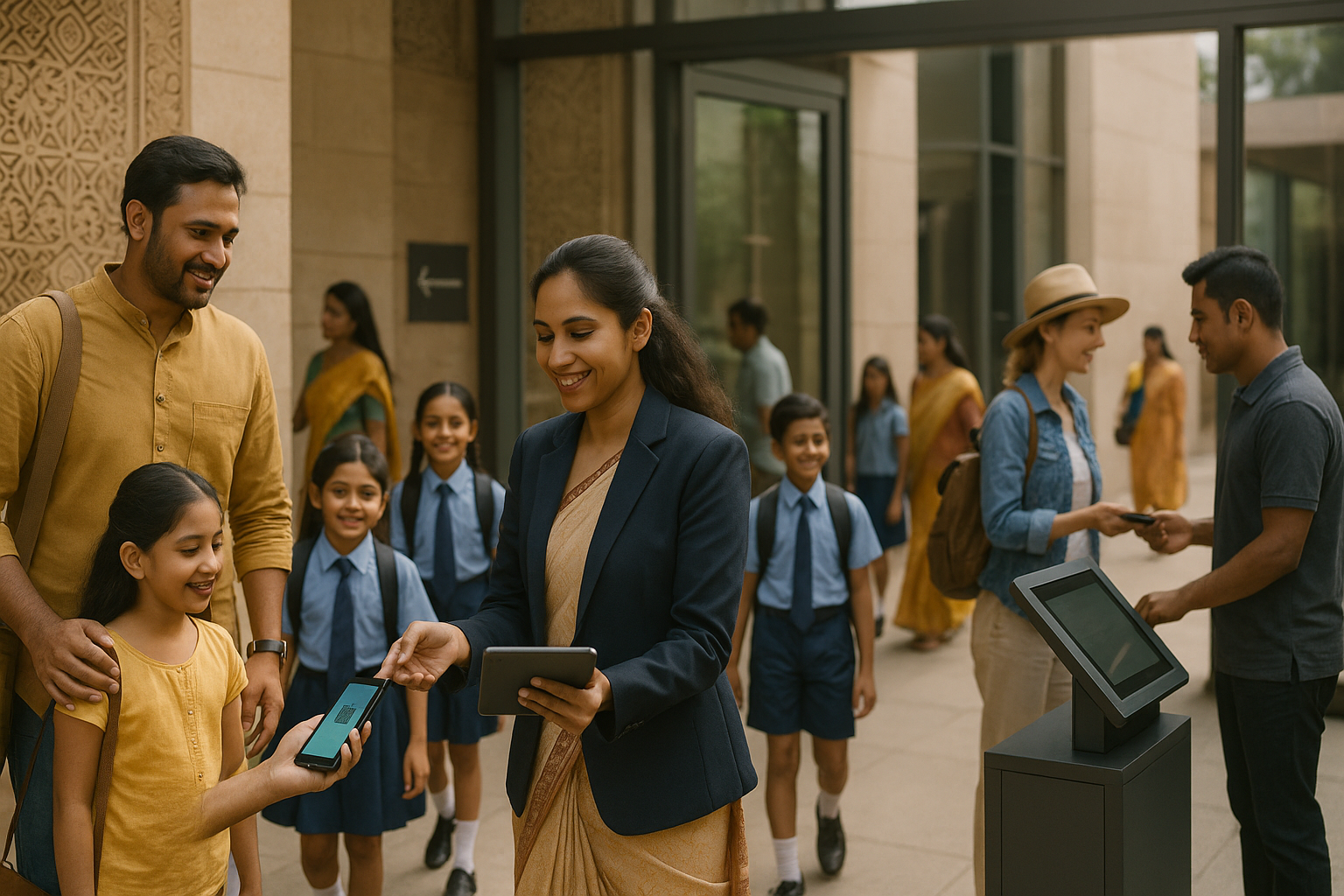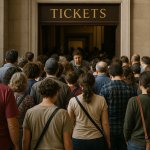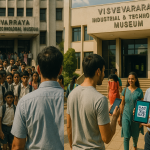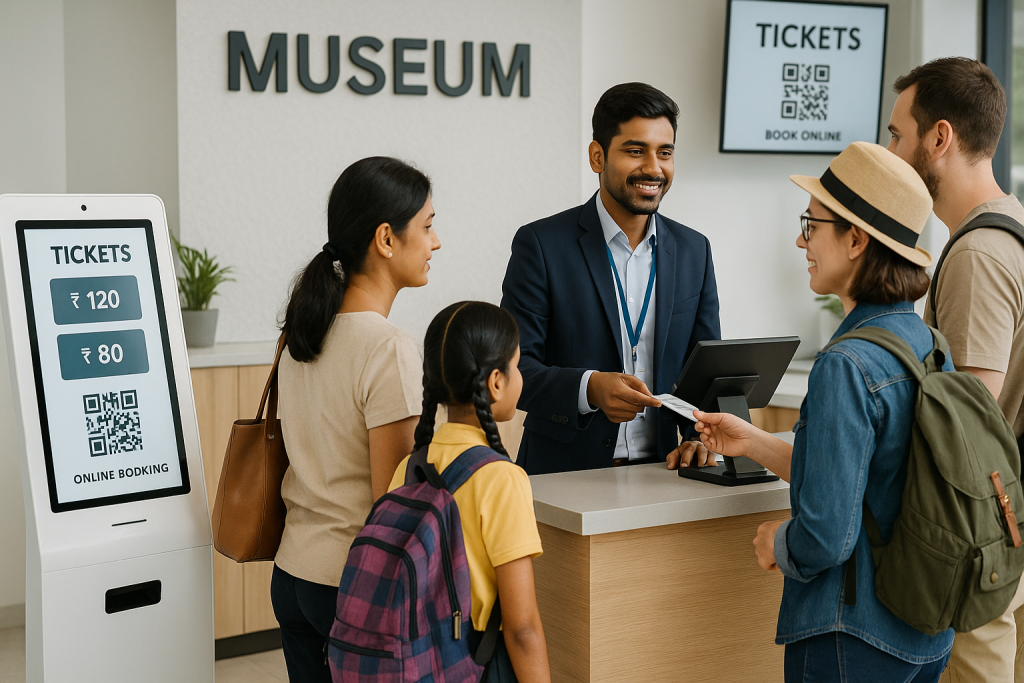Ticketing software for museums often stays unnoticed until something goes wrong. Imagine this: a family travels hours to visit a heritage museum. The kids feel excited, the parents plan the entire day. At the counter, a long queue forms. The card machine stops working. Staff writes receipts by hand. After 30 minutes of waiting, the family leaves.
Moments like this hurt more than ticket revenue. They break trust. In 2025, visitors expect smooth experiences. Quick mobile bookings, easy check-ins, and clear pricing are the new standard.
The right ticketing software makes this possible. This guide covers the 5 best ticketing software options for museums in 2025, and how each one avoids situations like the story above.
EveryTicket
EveryTicket is built for Indian museums, not concerts or theaters. That means it actually understands your day-to-day needs. From school groups arriving in buses to families buying last-minute tickets at the gate, the system handles it all without fuss.
It comes ready with group booking tools, school trip management, regional language support, and both counter and online ticket sales. Even if your internet cuts out, you can keep selling tickets, the software is offline-ready. Real-time reports and a built-in CRM give you clear insights into who visits, when they visit, and how you can bring them back.
- Strengths: Seamless integration of POS and online sales, paperless QR-based tickets, regional language capability, and a simple setup process. It is cost-effective and built to work even in low-connectivity areas, suiting Indian museum infrastructure
- Best for: Small to mid-size museums and those needing a solution explicitly designed for museum workflows in the Indian context. EveryTicket is launched on ProductHunt and ranked in top 20.
- Limitations: As a newer product, some advanced integrations or niche features may be under development.
Eventbrite
Eventbrite is a globally recognized event ticketing leader that works well for community museums or institutions running frequent workshops, special events, or educational programs.
- Strengths: User-friendly interface, strong online presence, seamless integration with marketing platforms, and a smooth booking experience for visitors. Its ticketing services are mobile-friendly and support rapid setup for new events.
- Best for: Museums running varied or community-oriented programming who want a quick, scalable booking solution without in-depth customization.
- Limitations: Not museum-specific and lacks advanced features like collection management or integration with membership and donation workflows typically required by larger cultural institutions.
Ticketmaster
Ticketmaster is globally known for large-scale ticketing and is especially optimal for museums hosting blockbuster events, major exhibitions, or live programs with anticipated high footfall.
- Strengths: Leading-edge features in mobile ticket delivery, robust fraud prevention, and reputation for handling large volumes with little downtime. Strong analytics and reporting ensure institutions can manage spikes in demand.
- Best for: Large museums or cultural venues planning for international exhibitions, concerts, or festivals with high ticket volumes or security concerns.
- Limitations: May be too complex and expensive for small museums; includes numerous features unnecessary for simple, day-to-day museum admissions.
VBO Tickets
VBO Tickets is a global platform that many cultural spaces use, including museums. It offers a wide range of tools in one system, ticketing, memberships, donations, and even e-commerce. On paper, it looks like a complete package.
But here’s the challenge: it’s not built with Indian museums in mind. Setting it up takes time, and you often need a tech-savvy team to customize the software, connect APIs, or make it match your branding. Smaller museums may find the process heavy compared to simpler, ready-to-use systems.
- Strengths: Covers multiple areas like memberships, donations, and ticketing. Integrates with websites and supports advanced customizations.
- Best for: Larger museums with in-house tech teams that want full control over integrations and have the budget to manage them.
- Limitations: Setup can feel complex. Works best for institutions with IT support, making it harder for small to mid-sized Indian museums to adopt smoothly.
Tessitura
Some large cultural institutions use platforms like Tessitura. It covers everything, ticketing, memberships, donations, CRM, and website integrations. But with that scope comes complexity. Implementation takes months, costs run high, and day-to-day support often needs a full IT team. For smaller and mid-sized museums, it can feel like using a rocket ship just to cross the street —powerful, yes, but overwhelming and out of reach.
- Strengths: Extremely comprehensive, highly customizable, and trusted by some of the largest cultural centers worldwide.
- Best for: Huge museums with big budgets, large staff teams, and long-term IT support in place.
- Limitations: Expensive, complex, and resource-heavy. Not practical for most Indian museums looking for something quick to set up and easy to manage.
Comparison of Ticketing Software for Museums
| Software | Ideal For | Unique Strengths | Limitations |
|---|---|---|---|
| EveryTicket | Small/mid Indian museums | Local support, group/school ticketing, CRM, offline | Newer, evolving product |
| Eventbrite | Community programs | Simple setup, intuitive, strong marketing tools | Not museum-specific |
| Ticketmaster | Large events | Handles peak volumes, secure, excellent mobile | Expensive and overbuilt for small scale |
| VBO Tickets | Mid-sized/growing venues | Seamless web integration, e-commerce, CRM, SSO | Requires tech setup, best for digital focus |
| Tessitura | Enterprise/larger orgs | Full integration, deep customization, top-tier CRM | Expensive, high IT/resource requirements |
How to Choose Right Ticketing Software
Every museum is different. The right ticketing software depends on what you care about most.
If you run a small or regional museum, you probably don’t have a huge budget or a full tech team. What you need is something simple, affordable, and reliable. That’s where tools like EveryTicket shine. It’s built to be easy from day one, so you don’t waste time figuring things out.
If you manage a large institution with complex events and heavy visitor flow, you might lean toward platforms like Tessitura or Ticketmaster. They’re powerful but often expensive and heavy to maintain. Not every team has the resources to handle that.
For community-focused or event-heavy museums, Eventbrite is popular. It works, but it’s not designed specifically for museums. You end up adjusting your process to fit the tool, instead of the other way around.
Here’s the truth: in 2025, good ticketing software should all do the basics, mobile booking, cloud-based access, timed entry, group management, analytics, multilingual support, and flexible online + in-person sales. That’s the starting line.
The difference comes down to fit. And this is where EveryTicket stands apart. It gives you enterprise-level features without the enterprise headache. It scales with your growth, handles both big events and daily visitors, and keeps things simple for your staff.
So when you’re choosing, ask yourself:
Do you want software that makes you adjust to it? Or do you want one that adjusts to you?
That’s the gap EveryTicket was built to fill.
Wrap-up!
At the end of the day, ticketing software shouldn’t just “manage sales.” It should feel like a partner that grows with your museum.
That’s why we built EveryTicket. It’s simple for your staff, smooth for your visitors, and strong enough to handle the busiest weekends without breaking a sweat. You don’t have to compromise between affordability, ease of use, and enterprise-level features because EveryTicket gives you all three.
If you’re serious about making ticketing effortless and future-ready, EveryTicket is the one solution you won’t outgrow.
Fill out the quick inquiry form today and book your free demo. See for yourself how EveryTicket can transform the way your museum welcomes the world.



